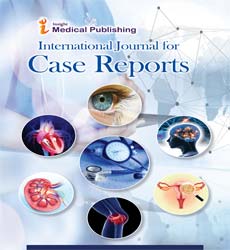Commentary on COVID-19
Frank X Gu*
1Department of Chemical Engineering, University of Toronto, Toronto, Canada
- *Corresponding Author:
- Frank X Gu Department of Chemical Engineering, University of Toronto, Toronto,Canada E-mail: f.gu@utoronto.ci
Received Date: August 8, 2021; Accepted Date: August 22, 2021; Published Date: August 29, 2021
Citation: Gu FX (2021) Commentary on COVID-19. Int J Case Rep Vol.5 No.5:55
Description
The World Health Organization has classified the Coronavirus Disease-2019 outbreak (COVID-19) a pandemic. In severe COVID-19 cases, studies have found a severe inflammatory syndrome and a procoagulant state, as well as an increase in venous thromboembolism, such as Pulmonary Embolism (PE) and Deep Vein Thrombosis (DVT). COVID-19, a novel coronavirus pandemic, has already infected over 18 million people around the world. SARS-CoV-2, like other coronaviruses, causes a deep dysregulation of the immune system, resulting in respiratory failure and systemic hyper inflammation in critically unwell people. Immunotherapy is frequently used to reduce the negative consequences of disease caused by high levels of cytokines. In coronavirus disease 2019 (COVID-19), the significance of tracheostomy is unclear, with numerous consensus guidelines advocating against it. To make ward care of tracheotomised COVID-19 patients easier, we created a specialised airway team and a coordinated education programme. We provide the results of the first 100 COVID-19 patients who had a tracheostomy at our facility. Infectioninduced immune system disruption can lead to psychopathology, and psychiatric consequences have been reported in the aftermath of prior coronavirus outbreaks. The propagation of the Coronavirus Severe Acute Respiratory Syndrome COVID-19 pandemic could have psychological consequences. The role of clinical and inflammatory indicators on the psychopathological effects of COVID-19 in survivors was studied. Because of excessive inflammation, platelet activation, endothelial dysfunction, and stasis, Coronavirus Disease-2019 COVID-19, a viral respiratory illness caused by the severe acute respiratory syndrome-coronavirus-2 SARS-CoV-2, may predispose patients to thrombotic disease in both the venous and arterial circulations. Furthermore, many individuals undergoing antithrombotic medication for thrombotic illness may develop COVID-19, which may have implications for antithrombotic drug selection, dose, and laboratory monitoring. Lung Ultra Sonography (LUS) has recently been shown to be effective in detecting coronavirus illness 19 pneumonia. However, no information on the use of LUS in children with COVID-19 pneumonia is known. The LUS features of ten consecutively hospitalised infants with COVID-19 in two tertiary-level paediatric hospitals in Rome are described in this paper. COVID-19 has been linked to negative outcomes among ethnic minority populations, according to growing data. However, nothing is known about how ethnicity and household size affect the risk of SARS-CoV-2 infection. The COVID-19 epidemic has quickly spread around the world. Patients with COVID-19 frequently have aberrant liver function, which can manifest as hepatitis, cholestasis, or both. Various clinical circumstances may have different clinical implications for liver impairment. During the pandemic, clinical scenarios are discussed, including the use of pharmacological treatment for COVID-19 in the case of liver derangement, as well as the assessment and management of patients with chronic hepatitis B or C, nonalcoholic fatty liver disease, liver cirrhosis, and liver transplantation. In COVID-19, pneumonia with severe respiratory failure is the leading cause of death, with hyperinflammation playing a key role in lung destruction. As a result, an efficient medication that reduces inflammation without impeding viral clearance is urgently required. Tocilizumab, a monoclonal antibody that targets the soluble IL-6 receptor, has been recommended as a therapy for COVID-19 patients. Cancer appears to have an independent negative prognostic effect on COVID-19-related mortality, although its impact on different patient subgroups is unknown. A population-based analysis of COVID-19 individuals with prior or current solid cancer versus those without cancer is presented.
Open Access Journals
- Aquaculture & Veterinary Science
- Chemistry & Chemical Sciences
- Clinical Sciences
- Engineering
- General Science
- Genetics & Molecular Biology
- Health Care & Nursing
- Immunology & Microbiology
- Materials Science
- Mathematics & Physics
- Medical Sciences
- Neurology & Psychiatry
- Oncology & Cancer Science
- Pharmaceutical Sciences
